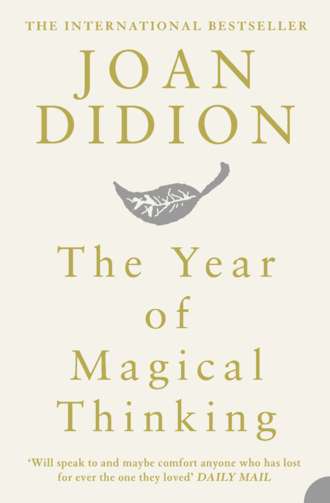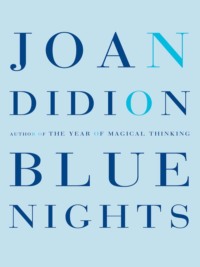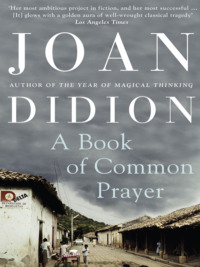
Полная версия
The Year of Magical Thinking

WINNER OF THE NATIONAL BOOK AWARD
‘A beautiful and devastating book’
ZADIE SMITH
The Year of Magical Thinking speaks beautifully and heart-rendingly of the power love has to give life meaning.
When Joan Didion’s husband died suddenly of a massive heart attack, a partnership of 40 years ended in a second. Just days before, the couple had seen their only daughter fall seriously ill. Despite the unshakable reality of her husband’s death, Joan Didion’s thinking was far from down to earth – she found herself, for instance, keeping his shoes in case he returned. Slowly she realised that beneath all the ritual and words lay a simple, aching truth – that she longed to perform an impossible trick and bring him back. This is the story of a year spent wishing; a year of magical thinking.
‘A poised, heart-rending memoir’
JOYCE CAROL OATES
‘A masterpiece of restraint and perception’
SUNDAY TIMES
‘Wise and profoundly affecting’
CRAIG BROWN, MAIL ON SUNDAY

Quintana Roo, John Gregory Dunne and Joan Didion, Malibu, 1976
The Year of Magical Thinking
JOAN DIDION

Copyright
Harper Perennial
An imprint of HarperCollinsPublishers 1 London Bridge Street London SE1 9GF
www.harperperennial.co.uk
This edition published by Harper Perennial 2006
First published in Great Britain by Fourth Estate in 2005
Copyright © Joan Didion 2005
Joan Didion asserts the moral right to be identified as the author of this work
A catalogue record for this book is available from the British Library
All rights reserved under International and Pan-American Copyright Conventions. By payment of the required fees, you have been granted the non-exclusive, non-transferable right to access and read the text of this e-book on-screen. No part of this text may be reproduced, transmitted, down-loaded, decompiled, reverse engineered, or stored in or introduced into any information storage and retrieval system, in any form or by any means, whether electronic or mechanical, now known or hereinafter invented, without the express written permission of HarperCollins e-books.
This book is sold subject to the condition that it shall not, by way of trade or otherwise, be lent, re-sold, hired out or otherwise circulated without the publisher’s prior consent in any form of binding or cover other than that in which it is published and without a similar condition including this condition being imposed on the subsequent purchaser.
Ebook Edition © FEBRUARY 2009 ISBN: 9780007318001
Version: 2017-03-16
From the reviews of The Year of Magical Thinking:
‘This is a beautiful and devastating book by one of the finest writers we have. Didion has always been a precise, humane and meticulously truthful writer, but on the subject of death she becomes essential’
ZADIE SMITH
‘The book of the year … a heartbreaking, passionate book that offers no easy answers’
Guardian
‘A poised, heart-rending memoir’
JOYCE CAROL OATES
‘Joan Didion has produced, with desperate honesty, a book about loss and grief … It is astonishing to find a great subject, in all its sorrow, meeting its match in one of the true talents of our age’
COLM TóIBíN
‘A gripping account of the workings of bereavement and grief, unflinchingly analysed’
HERMIONE LEE, TLS
‘I read The Year of Magical Thinking in a sitting and can’t get over it. It’s not merely my book of the year, but one of my books of the decade. The precision of the memoir is astonishing, the value of the lives immeasurable. As a portrait of a marriage and an encapsulation of the writing life, as a commemoration of grief and a testament of love, this is a book that will never leave the mind of anyone who reads it’
ANDREW O’HAGAN, Scotsman
‘A luminously shocking memoir of bereavement … Her triumph is to show us that artifice – the shaping of prose, the arrangement of memory – need not strip the rawness of lived experience of its power’
ALEX CLARK, Daily Telegraph
‘The Year of Magical Thinking is in fact a year of lucid and rational thinking, about grief and mourning and feared loss; this account of a husband’s death and daughter’s grave illness is the more moving for not trying to be’
JULIAN BARNES
‘Her book, exploring an agonising universal experience, will speak to and maybe comfort anyone who has lost for ever the one they loved’
VAL HENNESSY, Daily Mail
‘You get her peerless sharp, stylish reporting and almost forensic attention to detail. To see her turning these instruments on her own ordeal is as shocking as it is moving. Grief, writes Didion, takes us to a place none of us knows till we reach it’
DAVID ROBSON, Daily Express
‘A masterpiece of restraint and perception … Utterly compelling’
Sunday Times
‘Wise and profoundly affecting’
CRAIG BROWN, Mail on Sunday
‘A masterpiece … dense with sentiment, without ever being sentimental, tough, witty, broken, tender and flawlessly sustained. The amount of risk in her writing is extraordinary and exemplary’
ADAM THIRLWELL, Observer
‘A spell-bindingly clear-eyed account of bereavement’
Evening Standard
‘An exceptional study of the nature of grief’
Independent on Sunday
‘Didion skilfully illuminates past happiness, a marriage close as a shared breath … a remarkable writer … a brave book’
MIRANDA SEYMOUR, Sunday Times
‘Taking the reader to places where they would not otherwise go is, of course, one of the things a really good book can do. Powerful, moving and true’
CRESSIDA CONNOLLY, Spectator
‘The book achieves something that Didion herself thought impossible – it gives voice to the most inarticulate of emotions. It is an extraordinarily eloquent cry of pain’
LISA ALLARDICE, New Statesman
‘Α rare example of a book which is both raw and thoughtful’
MARK LAWSON, Sunday Telegraph
‘The Year of Magical Thinking is powerfully moving, a work of surpassing clarity and truthfulness … quite unlike any other memoir I’ve read. As with most truly great books, there are no bogus resolutions. Questions are unanswered, huge tensions unresolved, but somehow you’re consoled: it’s really a book about living’
JOSEPH O’CONNOR, Irish Independent
‘Will speak to anyone who has ever loved a husband, wife or child’
Economist
‘Cool has been Didion’s literary trademark, but this brave book maps a year in her life when the world flipped over to expose the underside of cool where things go bad’
The Times
‘I can’t think of a book we need more than hers. I can’t imagine dying without this book’
JOHN LEONARD, New York Review of Books
‘Stunning candour and piercing details. An indelible portrait of loss and grief. A haunting portrait of a four-decade-long marriage’
MICHIKO KAKUTANI, New York Times
This book is for John and for Quintana
Contents
Cover Excerpt Title Page Copyright Review Dedication 1. 2. 3. 4. 5. 6. 7. 8. 9. 10. 11. 12. 13. 14. 15. 16. 17. 18. 19. 20. 21. 22. PERMISSIONS ACKNOWLEDGMENTS Excerpt from Blue Nights, a sequel to The Year of Magical Thinking Chapter 1:Blue Nights Chapter 2:Blue Nights About the Author Also By Joan Didion About the Publisher
1.
Life changes fast. Life changes in the instant. You sit down to dinner and life as you know it ends. The question of self-pity.
Those were the first words I wrote after it happened. The computer dating on the Microsoft Word file (“Notes on change.doc”) reads “May 20, 2004, 11:11 p.m.,” but that would have been a case of my opening the file and reflexively pressing save when I closed it. I had made no changes to that file in May. I had made no changes to that file since I wrote the words, in January 2004, a day or two or three after the fact.
For a long time I wrote nothing else.
Life changes in the instant.
The ordinary instant.
At some point, in the interest of remembering what seemed most striking about what had happened, I considered adding those words, “the ordinary instant.” I saw immediately that there would be no need to add the word “ordinary,” because there would be no forgetting it: the word never left my mind. It was in fact the ordinary nature of everything preceding the event that prevented me from truly believing it had happened, absorbing it, incorporating it, getting past it. I recognize now that there was nothing unusual in this: confronted with sudden disaster we all focus on how unremarkable the circumstances were in which the unthinkable occurred, the clear blue sky from which the plane fell, the routine errand that ended on the shoulder with the car in flames, the swings where the children were playing as usual when the rattlesnake struck from the ivy. “He was on his way home from work—happy, successful, healthy—and then, gone,” I read in the account of a psychiatric nurse whose husband was killed in a highway accident. In 1966 I happened to interview many people who had been living in Honolulu on the morning of December 7, 1941; without exception, these people began their accounts of Pearl Harbor by telling me what an “ordinary Sunday morning” it had been. “It was just an ordinary beautiful September day,” people still say when asked to describe the morning in New York when American Airlines 11 and United Airlines 175 got flown into the World Trade towers. Even the report of the 9/11 Commission opened on this insistently premonitory and yet still dumbstruck narrative note: “Tuesday, September 11, 2001, dawned temperate and nearly cloudless in the eastern United States.”
“And then—gone.” In the midst of life we are in death, Episcopalians say at the graveside. Later I realized that I must have repeated the details of what happened to everyone who came to the house in those first weeks, all those friends and relatives who brought food and made drinks and laid out plates on the dining room table for however many people were around at lunch or dinner time, all those who picked up the plates and froze the leftovers and ran the dishwasher and filled our (I could not yet think my) otherwise empty house even after I had gone into the bedroom (our bedroom, the one in which there still lay on a sofa a faded terrycloth XL robe bought in the 1970s at Richard Carroll in Beverly Hills) and shut the door. Those moments when I was abruptly overtaken by exhaustion are what I remember most clearly about the first days and weeks. I have no memory of telling anyone the details, but I must have done so, because everyone seemed to know them. At one point I considered the possibility that they had picked up the details of the story from one another, but immediately rejected it: the story they had was in each instance too accurate to have been passed from hand to hand. It had come from me.
Another reason I knew that the story had come from me was that no version I heard included the details I could not yet face, for example the blood on the living room floor that stayed there until Jose came in the next morning and cleaned it up.
José. Who was part of our household. Who was supposed to be flying to Las Vegas later that day, December 31, but never went. José was crying that morning as he cleaned up the blood. When I first told him what had happened he had not understood. Clearly I was not the ideal teller of this story, something about my version had been at once too offhand and too elliptical, something in my tone had failed to convey the central fact in the situation (I would encounter the same failure later when I had to tell Quintana), but by the time José saw the blood he understood.
I had picked up the abandoned syringes and ECG electrodes before he came in that morning but I could not face the blood.
In outline.
It is now, as I begin to write this, the afternoon of October 4, 2004.
Nine months and five days ago, at approximately nine o’clock on the evening of December 30, 2003, my husband, John Gregory Dunne, appeared to (or did) experience, at the table where he and I had just sat down to dinner in the living room of our apartment in New York, a sudden massive coronary event that caused his death. Our only child, Quintana, had been for the previous five nights unconscious in an intensive care unit at Beth Israel Medical Center’s Singer Division, at that time a hospital on East End Avenue (it closed in August 2004) more commonly known as “Beth Israel North” or “the old Doctors’ Hospital,” where what had seemed a case of December flu sufficiently severe to take her to an emergency room on Christmas morning had exploded into pneumonia and septic shock. This is my attempt to make sense of the period that followed, weeks and then months that cut loose any fixed idea I had ever had about death, about illness, about probability and luck, about good fortune and bad, about marriage and children and memory, about grief, about the ways in which people do and do not deal with the fact that life ends, about the shallowness of sanity, about life itself. I have been a writer my entire life. As a writer, even as a child, long before what I wrote began to be published, I developed a sense that meaning itself was resident in the rhythms of words and sentences and paragraphs, a technique for withholding whatever it was I thought or believed behind an increasingly impenetrable polish. The way I write is who I am, or have become, yet this is a case in which I wish I had instead of words and their rhythms a cutting room, equipped with an Avid, a digital editing system on which I could touch a key and collapse the sequence of time, show you simultaneously all the frames of memory that come to me now, let you pick the takes, the marginally different expressions, the variant readings of the same lines. This is a case in which I need more than words to find the meaning. This is a case in which I need whatever it is I think or believe to be penetrable, if only for myself.
2.
December 30, 2003, a Tuesday.
We had seen Quintana in the sixth-floor ICU at Beth Israel North.
We had come home.
We had discussed whether to go out for dinner or eat in.
I said I would build a fire, we could eat in.
I built the fire, I started dinner, I asked John if he wanted a drink.
I got him a Scotch and gave it to him in the living room, where he was reading in the chair by the fire where he habitually sat.
The book he was reading was by David Fromkin, a bound galley of Europe’s Last Summer: Who Started the Great War in 1914?
I finished getting dinner, I set the table in the living room where, when we were home alone, we could eat within sight of the fire. I find myself stressing the fire because fires were important to us. I grew up in California, John and I lived there together for twenty-four years, in California we heated our houses by building fires. We built fires even on summer evenings, because the fog came in. Fires said we were home, we had drawn the circle, we were safe through the night. I lit the candles. John asked for a second drink before sitting down. I gave it to him. We sat down. My attention was on mixing the salad.
John was talking, then he wasn’t.
At one point in the seconds or minute before he stopped talking he had asked me if I had used single-malt Scotch for his second drink. I had said no, I used the same Scotch I had used for his first drink. “Good,” he had said. “I don’t know why but I don’t think you should mix them.” At another point in those seconds or that minute he had been talking about why World War One was the critical event from which the entire rest of the twentieth century flowed.
I have no idea which subject we were on, the Scotch or World War One, at the instant he stopped talking.
I only remember looking up. His left hand was raised and he was slumped motionless. At first I thought he was making a failed joke, an attempt to make the difficulty of the day seem manageable.
I remember saying Don’t do that.
When he did not respond my first thought was that he had started to eat and choked. I remember trying to lift him far enough from the back of the chair to give him the Heimlich. I remember the sense of his weight as he fell forward, first against the table, then to the floor. In the kitchen by the telephone I had taped a card with the New York–Presbyterian ambulance numbers. I had not taped the numbers by the telephone because I anticipated a moment like this. I had taped the numbers by the telephone in case someone in the building needed an ambulance.
Someone else.
I called one of the numbers. A dispatcher asked if he was breathing. I said Just come. When the paramedics came I tried to tell them what had happened but before I could finish they had transformed the part of the living room where John lay into an emergency department. One of them (there were three, maybe four, even an hour later I could not have said) was talking to the hospital about the electrocardiogram they seemed already to be transmitting. Another was opening the first or second of what would be many syringes for injection. (Epinephrine? Lidocaine? Procainamide? The names came to mind but I had no idea from where.) I remember saying that he might have choked. This was dismissed with a finger swipe: the airway was clear. They seemed now to be using defibrillating paddles, an attempt to restore a rhythm. They got something that could have been a normal heartbeat (or I thought they did, we had all been silent, there was a sharp jump), then lost it, and started again.
“He’s still fibbing,” I remember the one on the telephone saying.
“V-fibbing,” John’s cardiologist said the next morning when he called from Nantucket. “They would have said ‘V-fibbing.’ V for ventricular.”
Maybe they said “V-fibbing” and maybe they did not. Atrial fibrillation did not immediately or necessarily cause cardiac arrest. Ventricular did. Maybe ventricular was the given.
I remember trying to straighten out in my mind what would happen next. Since there was an ambulance crew in the living room, the next logical step would be going to the hospital. It occurred to me that the crew could decide very suddenly to go to the hospital and I would not be ready. I would not have in hand what I needed to take. I would waste time, get left behind. I found my handbag and a set of keys and a summary John’s doctor had made of his medical history. When I got back to the living room the paramedics were watching the computer monitor they had set up on the floor. I could not see the monitor so I watched their faces. I remember one glancing at the others. When the decision was made to move it happened very fast. I followed them to the elevator and asked if I could go with them. They said they were taking the gurney down first, I could go in the second ambulance. One of them waited with me for the elevator to come back up. By the time he and I got into the second ambulance the ambulance carrying the gurney was pulling away from the front of the building. The distance from our building to the part of New York–Presbyterian that used to be New York Hospital is six crosstown blocks. I have no memory of sirens. I have no memory of traffic. When we arrived at the emergency entrance to the hospital the gurney was already disappearing into the building. A man was waiting in the driveway. Everyone else in sight was wearing scrubs. He was not. “Is this the wife,” he said to the driver, then turned to me. “I’m your social worker,” he said, and I guess that is when I must have known.
“I opened the door and I seen the man in the dress greens and I knew. I immediately knew.” This was what the mother of a nineteen-year-old killed by a bomb in Kirkuk said on an HBO documentary quoted by Bob Herbert in The New York Times on the morning of November 12, 2004. “But I thought that if, as long as I didn’t let him in, he couldn’t tell me. And then it—none of that would’ve happened. So he kept saying, ‘Ma’am, I need to come in.’ And I kept telling him, ‘I’m sorry, but you can’t come in.’ ”
When I read this at breakfast almost eleven months after the night with the ambulance and the social worker I recognized the thinking as my own.
Inside the emergency room I could see the gurney being pushed into a cubicle, propelled by more people in scrubs. Someone told me to wait in the reception area. I did. There was a line for admittance paperwork. Waiting in the line seemed the constructive thing to do. Waiting in the line said that there was still time to deal with this, I had copies of the insurance cards in my handbag, this was not a hospital I had ever negotiated—New York Hospital was the Cornell part of New York-Presbyterian, the part I knew was the Columbia part, Columbia-Presbyterian, at 168th and Broadway, twenty minutes away at best, too far in this kind of emergency—but I could make this unfamiliar hospital work, I could be useful, I could arrange the transfer to Columbia-Presbyterian once he was stabilized. I was fixed on the details of this imminent transfer to Columbia (he would need a bed with telemetry, eventually I could also get Quintana transferred to Columbia, the night she was admitted to Beth Israel North I had written on a card the beeper numbers of several Columbia doctors, one or another of them could make all this happen) when the social worker reappeared and guided me from the paperwork line into an empty room off the reception area. “You can wait here,” he said. I waited. The room was cold, or I was. I wondered how much time had passed between the time I called the ambulance and the arrival of the paramedics. It had seemed no time at all (a mote in the eye of God was the phrase that came to me in the room off the reception area) but it must have been at the minimum several minutes.
I used to have on a bulletin board in my office, for reasons having to do with a plot point in a movie, a pink index card on which I had typed a sentence from The Merck Manual about how long the brain can be deprived of oxygen. The image of the pink index card was coming back to me in the room off the reception area: “Tissue anoxia for > 4 to 6 min. can result in irreversible brain damage or death.” I was telling myself that I must be misremembering the sentence when the social worker reappeared. He had with him a man he introduced as “your husband’s doctor.” There was a silence. “He’s dead, isn’t he,” I heard myself say to the doctor. The doctor looked at the social worker. “It’s okay,” the social worker said. “She’s a pretty cool customer.” They took me into the curtained cubicle where John lay, alone now. They asked if I wanted a priest. I said yes. A priest appeared and said the words. I thanked him. They gave me the silver clip in which John kept his driver’s license and credit cards. They gave me the cash that had been in his pocket. They gave me his watch. They gave me his cell phone. They gave me a plastic bag in which they said I would find his clothes. I thanked them. The social worker asked if he could do anything more for me. I said he could put me in a taxi. He did. I thanked him. “Do you have money for the fare,” he asked. I said I did, the cool customer. When I walked into the apartment and saw John’s jacket and scarf still lying on the chair where he had dropped them when we came in from seeing Quintana at Beth Israel North (the red cashmere scarf, the Patagonia windbreaker that had been the crew jacket on Up Close & Personal) I wondered what an uncool customer would be allowed to do. Break down? Require sedation? Scream?





